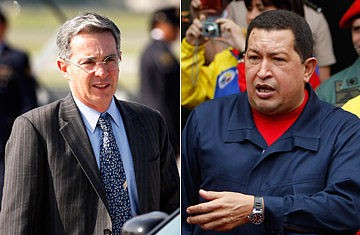
Colombian President Alvaro Uribe, left, and Venezuelan President Hugo Chávez
(2 of 2)
Either way, was Uribe's move as much a gift to Chávez as it was a slap in the face to Santos? Venezuela's oil economy is slumping badly, violent crime is rampant, and Chávez's Socialist Party is facing unusually competitive parliamentary elections in September. As a result, say critics, Chávez — who last year won a constitutional referendum to abolish presidential term limits — is more than glad to exploit the Colombian rift to galvanize his political base at home. (It's one reason, they suggest, that he exhumed the remains of South American independence hero and Venezuela native Simón Bolívar last week in hopes of proving that the icon died of foul play in Colombia in 1830 and not of natural causes.)
Still, many Venezuelan analysts don't believe this was Chávez's ideal scenario — or that he can really afford a protracted rupture of ties with Colombia. Even though Venezuela has been able to replace some of its Colombian imports with products from other South American countries, the process of getting those substitutes to market has been plagued with inefficiency and corruption. Last month, 22,000 tons of food imported by a state-run company were discovered rotting at a port, exacerbating the country's grocery shortages. "The supply from Colombia was much more automatic," says economist Pedro Palma of the Caracas consulting firm MetroEconómica. "Trucks delivered it directly" from across the border.
That's partly why Chávez was actually "looking to lower the temperature with Santos' government," argues independent political analyst Ricardo Sucre. Another reason: "He was looking for a photo op [with Santos at his inauguration] to say, 'I'm not as bad as they portray me — here I am greeting my archenemy.' " Chávez, fearing an assassination plot against him (as he so often does), announced last week that he would not attend Santos' swearing-in ceremony after accusing Uribe of making hostile noises again.
The Venezuela-Colombia diplomatic split, as a result, may not last far beyond Venezuela's Sept. 26 elections or perhaps even Santos' inauguration. Still, even if Santos and Chávez mend fences, the issue of Caracas' ties to the FARC won't disappear. Chávez on Thursday again called Uribe a "mafioso oligarch." But even if he isn't directly aiding the FARC, Chávez risks being labeled an abettor of terrorists by a larger swath of the international community if he doesn't crack down on the FARC's presence in Venezuela. At the same time, Santos has to reassure that community that he won't repeat Uribe's excesses, which included — while Santos was Defense Minister — secretly sending commandos across the border to kill FARC leaders in Ecuador in 2008.
A big question is whether the Obama Administration, which, like the Bush II Administration before it, considers Colombia its most important ally in South America, prefers Uribe's hard-line or Santos' softer approach to Chávez's. As much as Washington approved of Uribe's offensive against the FARC, it's also likely to endorse a Colombian foreign policy that doesn't so often play into Chávez's anti-U.S. hand. For his part, asked about Thursday's dismal outcome during a visit to Mexico, Santos just barely hid his irritation, saying, "It is much better to remain silent and express no position at all. President Uribe is the President of Colombia until Aug. 7." After which, the hemisphere could use fewer nervous breakdowns between Bogotá and Caracas.
— With reporting by Rachel Jones / Caracas and Dolly Mascareñas / Mexico City
